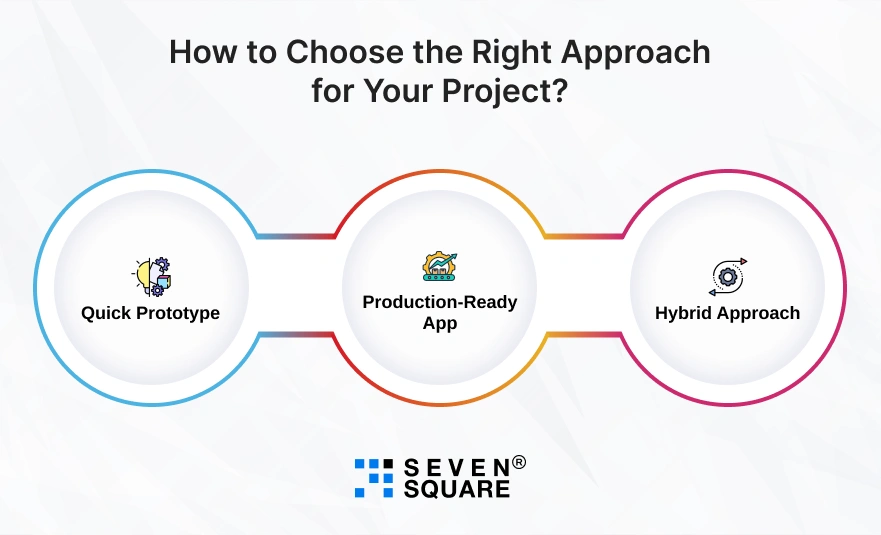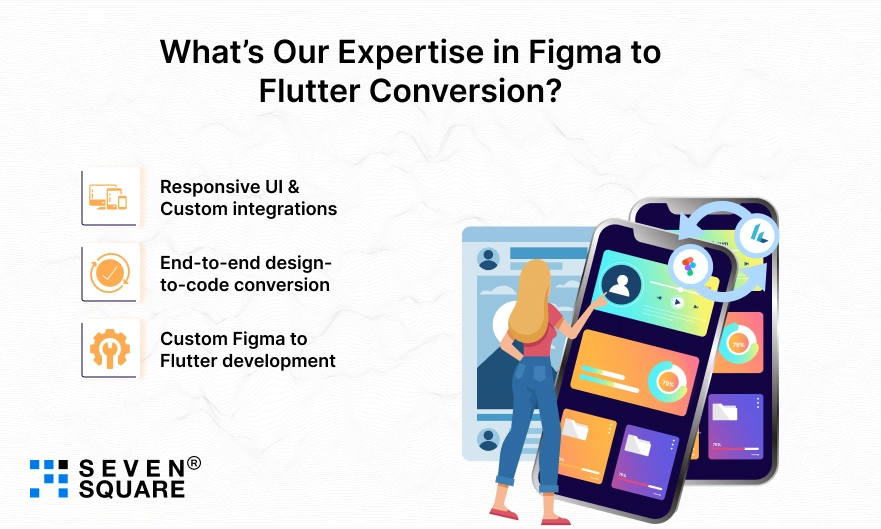You’ve designed a beautiful app in Figma, but turning it into a functional Flutter app can be tricky.
Many startups and businesses face this challenge: How to convert static Figma designs into fully working Flutter applications.
We understand it, but the core question is: Should you use automated tools for Figma to Flutter conversion, or invest in custom Figma to Flutter development?
Automated tools promise speed and convenience, while custom development guarantees precision, control, and a scalable solution.
Choosing the wrong path can lead to incomplete code, design inconsistencies, and delayed product launches.
In this blog, we’ll explain the pros and cons of automated Figma to Flutter solutions versus custom development, helping you choose the best approach for your project.
What Figma to Flutter Conversion? Why Does It Matter?
Before we compare tools and custom development, let’s understand what Figma to Flutter conversion really means.
Figma is a powerful UI/UX design tool that allows designers to create high-fidelity app interfaces.
Flutter is a robust framework for building cross-platform mobile applications with a single codebase.
Figma to Flutter conversion is the process of turning these static designs into functional Flutter code that developers can use to build real apps.
Benefits of Figma to Flutter Conversion
- Speed: Faster transition from design to development.
- Scalability: Clean Flutter code can easily adapt to growing app requirements.
- Maintainability: Well-structured code makes future updates and bug fixes easier.
Common Challenges
- Pixel-perfect conversion: Ensuring the app matches the original Figma design exactly.
- Animations and Interactions: Automated tools often struggle with complex transitions.
- Responsiveness: Adapting the UI smoothly to different devices can be tricky.
We focus on providing clarity and practical solutions. Understanding what Figma to Flutter conversion is and how it works is the first step to choosing the right approach.
Learn more about Best Figma to Frontend Tools.
Automated Tools for Figma to Flutter: FlutterFlow
When it comes to automated Figma to Flutter solutions, FlutterFlow stands out as one of the most popular Figma to Flutter tools.
It allows designers and developers to convert Figma designs into Flutter code quickly, making it a go-to option for rapid prototyping.
What is FlutterFlow?
FlutterFlow is a visual app builder that bridges the gap between design and development.
By importing your Figma files, you can generate Flutter code automatically and see your app come to life without writing every line of code manually.
Advantages of Using FlutterFlow
- Quick Prototyping: Instantly convert Figma designs into interactive Flutter apps.
- Reduced Manual Coding: Saves time by generating code for layouts, navigation, and basic interactions.
- Ease of Use: Even non-developers can create functional app prototypes with minimal technical knowledge.
- Integration Support: Connects with Firebase and other APIs for backend functionality.
Limitations of FlutterFlow
- Incomplete Production Code: While great for prototypes, FlutterFlow often generates code that needs developer refinement for production-ready apps.
- Customization Restrictions: Implementing complex features or unique animations can be challenging.
- Paid Subscription: FlutterFlow requires a subscription for full access, which may increase costs for startups or small businesses.
FlutterFlow can be the best choice for automated Figma to Flutter conversion when clients need a quick prototype or proof-of-concept app.
Learn the Tools to Combine with Lovable for Product Development.
Custom Figma to Flutter Development
Custom Figma to Flutter development is the gold standard for businesses that need a pixel-perfect, scalable, and maintainable app.
This approach involves dedicated developers converting your Figma designs into clean, production-ready Flutter code, according to your project requirements.
Advantages of Custom Development
- Pixel-Perfect UI: Every detail matches the original Figma design.
- Full Control: You can implement advanced features, custom animations, and integrations.
- Scalability: Code is structured for long-term growth and easier maintenance.
- Customized According to Business Needs: The app reflects your brand and functional requirements exactly.
Drawbacks
- Higher Cost: Custom development requires skilled developers and more time.
- Longer Development Time: Full production-ready apps take longer than automated prototypes.
Our custom Figma to Flutter development services follow a structured Figma to Flutter workflow that ensures quality, speed, and maintainability.
This approach is ideal for startups and enterprises looking for an app that truly stands out in the market.
Automated Tools vs Custom Development: The Comparison Table
Choosing between automated tools and custom development for Figma to Flutter conversion can be confusing.
To make it simple, we’ve created a clear comparison table highlighting the key differences:
| Feature | Automated Tools (e.g., FlutterFlow) | Custom Development |
|---|---|---|
| Speed | Fast as it quickly converts Figma designs into working prototypes. | Moderate as it requires dedicated developer effort. |
| Cost | Lower upfront as subscription or tool fees only. | Higher upfront because skilled developers are required. |
| Code Quality | Basic / Needs tweaking so it is good for prototypes, not production. | High / Production-ready which is clean, maintainable Flutter code. |
| Customization | Limited as it is difficult to implement complex features. | Full control according to your unique business needs. |
| Learning Curve | Low means non-developers can get started easily. | Moderate to high, which requires developer expertise. |
How to Choose the Right Approach for Your Project?

Selecting the right approach for your Figma to Flutter project depends on your goals, budget, and timeline. Here’s a simple guide from our perspective:
1. Quick Prototype: Automated Tools
- If your goal is to validate an idea quickly or create a minimum viable product (MVP), automated Figma to Flutter tools like FlutterFlow are ideal.
- They let you see your designs in action with minimal coding effort.
2. Production-Ready App: Custom Development
- When you need a fully functional, scalable, and maintainable app, investing in custom Figma to Flutter development services is the best choice.
- Our developers ensure pixel-perfect UI, responsive design, and clean Flutter code for long-term success.
3. Hybrid Approach: Start with Automation & Modify it with Developers
- Many businesses benefit from a hybrid approach: begin with automated tools for initial prototypes, then move to custom development to finalize features, optimize performance, and scale your app efficiently.
We help businesses to pick the Figma to Flutter conversion tools for startups while helping them on how to convert Figma designs to Flutter code.
Our goal is to balance speed, cost, and quality for every project.
What’s Our Expertise in Figma to Flutter Conversion?

We specialize in Figma to Flutter conversion services that help startups and enterprises transform their designs into fully functional Flutter apps.
Our team of experienced developers ensures that every project delivers pixel-perfect results, scalable code, and seamless user experiences.
- Custom Figma to Flutter development: Personalized solutions that match your business needs and app vision.
- End-to-end design-to-code conversion: We convert your Figma designs into clean, production-ready Flutter code with precision.
- Responsive UI & Custom integrations: Your app works smoothly on devices and includes all the interactive features you wanted.
Want to Convert Your Figma Design into Flutter Code? Contact Us Now!
Making the Smart Choice
Choosing between automated tools like FlutterFlow and custom Figma to Flutter development ultimately comes down to your project goals.
Automated tools are fast and convenient for quick prototypes, while custom development offers full control, higher code quality, & scalability for long-term success.
We provide end-to-end Figma to Flutter conversion services, ensuring your app looks perfect, performs smoothly, and meets your business goals.
FAQs
- Automated tools like FlutterFlow generate code quickly but often require refinement.
- Custom Figma to Flutter development ensures pixel-perfect, scalable, and production-ready apps.
- Some plugins and trial tools exist, but free options usually produce incomplete or low-quality code.
- Custom development ensures reliable, maintainable results.
- Yes, but generated code often requires cleanup and restructuring.
- For complex features or scalable apps, custom Figma to Flutter development ensures maintainable, clean code.
- It speeds up development, ensures consistent UI, supports responsive design, and creates scalable, maintainable Flutter apps.